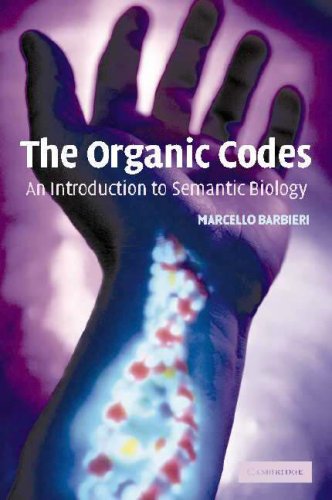

Most ebook files are in PDF format, so you can easily read them using various software such as Foxit Reader or directly on the Google Chrome browser.
Some ebook files are released by publishers in other formats such as .awz, .mobi, .epub, .fb2, etc. You may need to install specific software to read these formats on mobile/PC, such as Calibre.
Please read the tutorial at this link: https://ebookbell.com/faq
We offer FREE conversion to the popular formats you request; however, this may take some time. Therefore, right after payment, please email us, and we will try to provide the service as quickly as possible.
For some exceptional file formats or broken links (if any), please refrain from opening any disputes. Instead, email us first, and we will try to assist within a maximum of 6 hours.
EbookBell Team

4.7
16 reviews
ISBN 10: 0521531004
ISBN 13: 9780521531009
Author: Marcello Barbieri
The genetic code appeared on Earth with the first cells. The codes of cultural evolution arrived almost four billion years later. These are the only codes that are recognized by modern biology. In this book, however, Marcello Barbieri explains that there are many more organic codes in nature, and their appearance not only took place throughout the history of life but marked the major steps of that history. A code establishes a correspondence between two independent 'worlds', and the codemaker is a third party between those 'worlds'. Therefore the cell can be thought of as a trinity of genotype, phenotype and ribotype. The ancestral ribotypes were the agents which gave rise to the first cells. The book goes on to explain how organic codes and organic memories can be used to shed new light on the problems encountered in cell signalling, epigenesis, embryonic development, and the evolution of language.
1 THE MICROSCOPE AND THE CELL
The cell theory
The problem of generation
The problem of embryonic development
The two versions of the cell theory
Mechanism
The chemical machine
The computer model
The autopoietic cell
The epigenetic cell
2 THEORIES OF EVOLUTION
Traditional biology
Lamarck?s contribution
Darwin?s bet
Natural selection
Organs of extreme perfection
Common descent
The second mechanism of evolution
The Modern Synthesis
Molecular evolution
The third mechanism of evolution
Macroevolution
Where is biology going to?
3 A NEW MODEL FOR BIOLOGY
The logic of embryonic development
Reconstruction from incomplete projections
A memory-building approach
The algebraic method
The theoretical limit
ART: an iterative algebraic method
The memory matrix
Density modulation
MRM: the family of memory algorithms
The two general principles of MRM
4 ORGANIC CODES AND ORGANIC MEMORIES
The characteristics of codes
The organic codes? fingerprints
The bridge between genes and organisms
The splicing codes
The signal transduction codes
Contextual information
Determination and cell memory
The other face of pattern
Hints from developing neurons
The key structures of embryonic development
5 THE ORIGIN OF LIFE
The primitive Earth
Chemical evolution
Postchemical evolution
The metabolism paradigm
The replication paradigm
The RNA world
Replication catastrophes
Eigen?s paradox
The ribotype theory
The genetic code
Evolution of the code
The ribotype metaphor
Copymakers and codemakers
The handicapped replicator
6 PROKARYOTES AND EUKARYOTES
The potassium world
Two forms of life
Three primary kingdoms
The last common ancestor
The origins of bacteria
The cytoskeleton
The compartments
Chromosomes
The seven kingdoms
Three thousand million years
7 THE CAMBRIAN EXPLOSION
The fossil record
The experimental data
Body plans and phylotypic stages
The traditional explanations
The Cambrian singularity
The stumbling-block
The reconstruction model
Multicellular structures
Biological memories
A new model of the Cambrian explosion
The conservation of the phylotypic stage
8 SEMANTIC BIOLOGY
The semantic theory of the cell
The semantic theory of embryonic development
The mind problem
The semantic theory of mental development
Artifacts and natural selection
The semantic theory of evolution
About organic codes
The language model
The Individuality Thesis
The development of semantic biology
9 A BRIEF SUMMARY
The first principle
The second principle
The third principle
The fourth principle
The first model
The second model
The third model
The fourth model
Conclusion
APPENDIX DEFINITIONS OF LIFE
AFTERWORD
the organic codes an introduction to semantic biology
what are the codes for organic fruit
organic food code number
organic code starting with 6
organic basics discount codes
the organic pharmacy coupon code
Tags: Marcello Barbieri, organic, codes